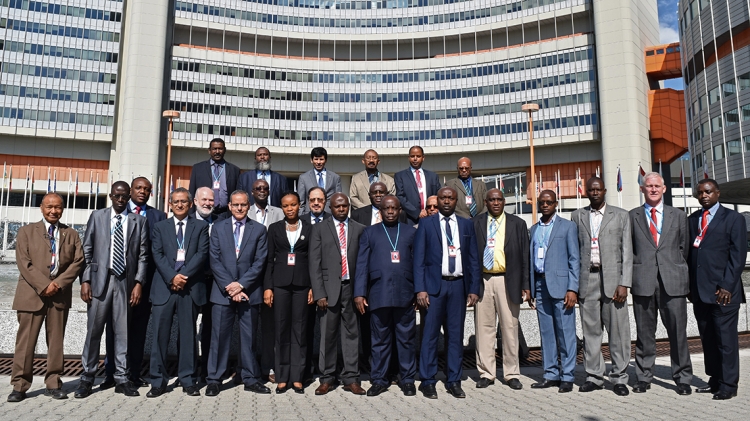Twenty-five senior representatives from 13 national nuclear institutions (NNIs) in Africa have met from 23 to 27 May to discuss opportunities to build self-reliance and sustainability. Working together over the course of the weeklong meeting, the participants, all Director Generals of Atomic Energy Commissions or their equivalent in their home countries, prepared a comprehensive road map to guide nuclear facilities, laboratories and counterpart institutions of Member States in the Africa region toward greater relevance, self-sufficiency and autonomy.
Most NNIs in the Africa region rely on government support, but this support has decreased in recent years, due to shifting priorities and unstable markets. However, each year, the role played by nuclear technologies in addressing development challenges grows, and in fact, the IAEA is currently supporting 43 countries in the Africa region in the development and implementation of innovative isotopic and nuclear technologies. For NNIs to mobilize their own resources, they must be able to demonstrate the contribution they can make to national development and income-generating activities.
Since 2014, the IAEA has worked with 12 Member States in the region to help NNIs to reach out potential end users of nuclear technology in the public and private sectors. The goal is to maximize their development contributions and to promote self-reliance by increasing their use of regional resources — including networks and partners, e-learning materials, regional experts, outreach and communications materials. These activities complement the 2014–2018 Regional Strategic Cooperative Framework of the African Regional Cooperative Agreement for Research, Development and Training related to Nuclear Science and Technology (AFRA), which emphasizes the need to promote self-reliance in nuclear applications through the pursuit of income-generating endeavours.
Member State NNIs have received support from the Agency in developing and implementing national strategies and business plans for the production of quality goods, the provision of services to the public and private sectors, and the generation of income. The participation of Egypt, Ghana Morocco, Nigeria, South Africa, and Tanzania – countries which possess robust human and physical infrastructure – in these activities has ensured a new degree of sustainability and relevance for nuclear research and development institutions in the region, and has helped them to reach out to end-users in both the public and private sectors through the execution of Strategic and Business Action Plans.
An expanded, regional project was launched in 2016 with the renewed aim of bolstering the self-reliance of national nuclear institutions, but with a focus on lower-income countries. The experiences of countries with more robust nuclear institutions were critical in illuminating any potential challenges or obstacles on the road toward self-sufficiency.



